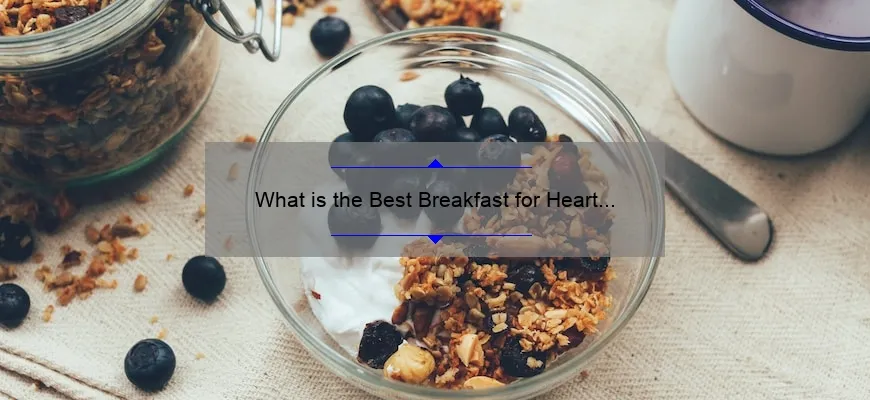Short answer: What is the best breakfast for heart patients?
The ideal breakfast for heart patients should include whole grains, fruits, low-fat dairy products, and lean proteins. Examples of healthy choices are oatmeal with berries, yogurt topped with nuts and seeds, or a vegetable omelet with whole wheat toast. It is important to limit sodium, added sugars, and saturated fats in the morning meal.
Understanding the Importance of Breakfast for Heart Patients
Understanding the Importance of Breakfast for Heart Patients
Breakfast is often hailed as the most important meal of the day, and this statement especially holds true for heart patients. In order to effectively manage their condition and promote a healthy heart, individuals with cardiovascular issues must prioritize a nutritious morning meal. By understanding the importance of breakfast for heart patients and making wise choices in their morning routine, these individuals can enhance their overall health and minimize any potential risks.
One key reason why breakfast plays such a vital role in heart health is its impact on blood sugar levels. Skipping breakfast has been associated with elevated blood sugar levels throughout the day, which can ultimately lead to insulin resistance, an increased risk of type 2 diabetes, and various cardiovascular complications. On the other hand, starting your day with a balanced meal rich in whole grains, lean proteins, and healthy fats can help regulate blood sugar levels and reduce these risks significantly.
Additionally, breakfast has been linked to weight management – a crucial factor in maintaining a healthy heart. Research indicates that individuals who regularly skip breakfast are more likely to be overweight or obese compared to those who eat breakfast daily. This excess weight puts extra strain on the cardiovascular system and increases the risk of high blood pressure, high cholesterol levels, and heart disease. Therefore, by incorporating a wholesome morning meal into their routine, heart patients can promote weight loss or maintenance while safeguarding against potential complications.
Another significant benefit derived from eating breakfast is improved cognitive function and mental health – factors that are closely tied to heart health as well. A well-balanced morning meal provides essential nutrients like vitamins B6 and B12 that support brain function and orchestrate mood regulation. By ensuring proper nourishment through breakfast consumption, heart patients can enhance their cognitive abilities, boost concentration levels throughout the day, and maintain emotional stability – all elements that contribute positively to overall cardiac health.
To obtain maximum benefits from breakfast for heart patients, it is essential to make mindful food choices. Opting for whole grain cereals or bread, as opposed to refined grains, provides a significant boost in fiber content and enables improved heart health. Incorporating fruits, such as berries or bananas, into the morning meal significantly increases the intake of essential nutrients and powerful antioxidants that protect against heart disease.
Furthermore, incorporating lean proteins like Greek yogurt or eggs into breakfast can sustain satiety levels throughout the day, preventing overeating during subsequent meals and helping to maintain a healthy weight. Adding heart-healthy fats from sources like avocados or nuts can further enhance nutrient absorption and promote better cholesterol levels – one of the primary indicators of cardiac well-being.
In conclusion, understanding the importance of breakfast for heart patients is crucial for promoting their overall health and reducing cardiovascular risks. By starting their day with a balanced meal rich in whole grains, lean proteins, fruits, and heart-healthy fats, individuals with heart conditions can regulate blood sugar levels, manage their weight effectively, improve cognitive function and emotional stability while ultimately safeguarding their hearts. So let’s make breakfast an integral part of our daily routine for a healthier future!
Step-by-Step Guide: Choosing the Best Breakfast Options for Heart Health
Step-by-Step Guide: Choosing the Best Breakfast Options for Heart Health
When it comes to maintaining a healthy heart, one of the most important aspects is starting your day with a nutritious breakfast. A well-balanced morning meal not only provides the energy your body needs but can also contribute significantly towards keeping your heart in excellent shape. In this step-by-step guide, we will dive into some clever and witty tips on how to choose the best breakfast options for optimal heart health.
1. Fiber Up Your Plate:
The first step in choosing a heart-healthy breakfast is ensuring that it is packed with dietary fiber. Opt for whole grain cereals or bread instead of their refined counterparts. Adding fruits like bananas, berries, or apples to your cereal or toast also boosts fiber intake while providing natural sweetness and essential nutrients.
2. Embrace Good Fats:
Contrary to popular belief, not all fats are bad for you! Incorporating healthy fats into your breakfast can be beneficial for heart health. Avocado slices on toast or a handful of nuts like almonds or walnuts are excellent choices as they contain monounsaturated fats that have been linked to lowering LDL cholesterol levels.
3. Power of Protein:
Including protein-rich ingredients in your morning meal can help keep you feeling fuller longer and assist in weight management—a significant factor in maintaining good cardiovascular health. Indulge in eggs, Greek yogurt, chia seeds, or tofu scrambles to kickstart your day with a protein punch.
4. Sneak in Superfoods:
Superfoods are nutrient powerhouses that can give an extra boost to your overall well-being, including heart health! Consider adding flaxseeds or chia seeds to your smoothies or oatmeal. Both these superfoods are packed with omega-3 fatty acids which have been shown to reduce inflammation and improve heart health.
5. Limit Added Sugars:
Excess sugar intake has been associated with various negative health effects, including heart disease. Be cautious with sugary cereals, flavored yogurts, or sweetened beverages that can often hide in seemingly healthy breakfast options. Opt for unsweetened variants and add natural sweetness with fresh fruits or a drizzle of honey.
6. Go Beyond Traditional:
Break free from the monotony of conventional breakfast choices and explore exciting alternatives. Switch up your morning routine by creating heart-healthy breakfast burritos using whole wheat tortillas, scrambled eggs, diced vegetables, and low-fat cheese. This creative twist provides a balanced meal with essential nutrients to jumpstart your day.
7. Portion Control:
While choosing nutritious ingredients is vital, it’s important to remember portion control as well. Overeating—even healthy foods—can lead to weight gain and put unnecessary stress on your heart. Stick to recommended serving sizes and listen to your body’s hunger cues for a wholesome start without going overboard.
By following this step-by-step guide and incorporating these clever tips into your routine, you’ll be able to choose the best breakfast options for your heart health while indulging your taste buds at the same time. So next time you’re preparing your morning meal, make it an opportunity to nourish yourself from within while giving some love to your heart!
Frequently Asked Questions about the Ideal Breakfast for Heart Patients
Welcome to our blog post where we will be answering some frequently asked questions about the ideal breakfast for heart patients. Maintaining a heart-healthy diet is crucial for individuals with heart conditions, and breakfast plays a vital role in starting the day right. So, let’s dive into these questions and provide you with detailed, professional, witty, and clever explanations.
Q1: What should a heart patient include in their breakfast?
A: A heart patient should prioritize foods that are low in saturated fat, cholesterol, and sodium to support their cardiovascular health. Incorporating whole grains such as oatmeal or whole wheat toast can provide fiber that helps lower bad cholesterol levels. Fresh fruits like berries or citrus fruits offer antioxidants that benefit vascular health. Including sources of lean protein like eggs or Greek yogurt can ensure a well-rounded meal.
Q2: Are there any specific nutrients or supplements that can benefit a heart patient’s breakfast?
A: While it is always best to obtain nutrients from whole foods, some supplements may have potential benefits. Omega-3 fatty acids found in fish oil supplements promote cardiovascular health by reducing inflammation. However, consulting with a healthcare professional before adding any supplements to your routine is crucial to ensure safety and determine suitable dosages.
Q3: How can I make my heart-healthy breakfast more exciting and delicious?
A: The key lies in creativity! Experimenting with various flavors and textures is essential for making your breakfast enjoyable while still maintaining its heart-healthy properties. Adding spices like cinnamon or nutmeg to oatmeal can enhance taste without adding excessive sugar. Incorporating different types of fresh fruit each day allows you to explore new flavors while reaping various nutritional benefits. Additionally, exploring healthy cooking techniques like poaching eggs or creating vegetable-packed omelets adds excitement to your morning meal.
Q4: Can breakfast options for heart patients be time-efficient during busy mornings?
A: Absolutely! It’s understandable that mornings can often feel rushed. However, planning ahead and utilizing time-saving options can make a heart-healthy breakfast feasible even on the busiest of mornings. Preparing overnight oats the night before allows you to wake up to a ready-to-eat meal packed with nutrition. Opting for single-serving yogurts or pre-cut fruits provides convenience without compromising health goals. Moreover, keeping hard-boiled eggs in the refrigerator can be a great grab-and-go option when quick protein is needed.
Q5: Is it okay to occasionally indulge in less healthy breakfast options?
A: The occasional treat or indulgence is perfectly fine, as long as it remains an exception rather than the norm. Balancing your overall diet is crucial, so occasional splurges on less healthy breakfast options won’t significantly impact your heart health if consumed sporadically and in moderation. The key is to prioritize nutrient-rich meals most of the time while allowing room for flexibility and enjoyment.
Remember, being mindful of your choices and adopting healthy habits throughout the day contributes significantly to your overall heart health – breakfast serves as a fantastic starting point! By making informed decisions and incorporating delicious yet nutritious options into your morning routine, you are setting yourself up for a vibrant and heart-healthy lifestyle.
We hope these detailed, professional, witty, and clever explanations have helped answer your questions about the ideal breakfast for heart patients. As always, consulting with medical professionals or registered dietitians will provide personalized guidance tailored specifically to your needs. Good luck on your journey towards optimal cardiovascular health!
Key Nutrients to Incorporate in a Heart-Healthy Breakfast
Eating a heart-healthy breakfast is a great way to kickstart your day and ensure you’re providing your body with the essential nutrients it needs. Your morning meal sets the tone for the rest of the day, so why not make it both delicious and good for your heart? In this article, we will delve into key nutrients that you should incorporate into your breakfast routine for optimal heart health.
1. Fiber – The importance of fiber in maintaining a healthy heart cannot be overstated. Foods rich in soluble fiber, such as oatmeal, whole grain bread, and fruits like apples and berries, help lower cholesterol levels, reduce inflammation, and regulate blood sugar levels. Moreover, fiber keeps you feeling full for longer periods of time, curbing overeating.
2. Omega-3 Fatty Acids – These healthy fats are known to provide numerous benefits to cardiovascular health. Including sources like flaxseeds or chia seeds in your breakfast can increase your intake of omega-3 fatty acids. Alternatively, you can enjoy fatty fish like salmon or sardines as part of a balanced morning meal. Incorporating these omega-3 powerhouses decreases inflammation in arteries while reducing the risk of developing heart disease.
3. Antioxidants – To actively combat free radicals that cause oxidative stress on our bodies’ cells and tissues – which puts us at risk for heart disease – incorporating antioxidant-rich foods into our breakfasts is essential. Berries (such as blueberries or strawberries) pack a punch with their high levels of antioxidants while also adding natural sweetness to meals.
4. Protein – While often associated with fitness enthusiasts seeking muscle development, protein plays an important role in maintaining overall cardiovascular health due to its beneficial effects on blood pressure management and reduction of LDL (bad) cholesterol levels. Include sources like Greek yogurt or eggs in your breakfast to give yourself a protein-packed start to the day.
5. Potassium – Found abundantly in bananas, oranges, and avocados, potassium acts as a natural blood pressure regulator, thus reducing the risk of high blood pressure and heart disease. Incorporating these nutrient-dense foods into your breakfast not only provides essential vitamins and minerals but also keeps your heart in top shape.
6. Whole Grains – Unrefined whole grains like quinoa, brown rice, or whole grain bread are rich in fiber, providing you with long-lasting energy while also offering numerous cardiovascular benefits. They help regulate blood sugar levels and reduce cholesterol buildup in arteries, decreasing the risk of heart disease.
Now that you have a plethora of key nutrients to focus on for a heart-healthy breakfast let’s get creative! Start your day with a delicious bowl of oatmeal topped with antioxidant-rich berries and sprinkled with ground flaxseeds for added omega-3 fatty acids. Or whip up a protein-packed spinach omelet using eggs generously filled with potassium-rich avocado slices.
Remember to keep things interesting by rotating ingredients to prevent meal monotony. Making small adjustments to your breakfast routine can go a long way in promoting heart health and overall wellbeing. Experimenting with different combinations allows you to enjoy an exciting array of flavors while taking care of your cardiovascular system.
Whether it is incorporating fiber-filled fruits or savoring delectable fish packed with omega-3s, each nutrient plays an integral role in improving heart function and safeguarding against various diseases. So don’t just settle for ordinary – make your breakfast extraordinary by embracing these key nutrients for exceptional heart health!
Delicious and Wholesome Recipes for a Nourishing Breakfast for Heart Patients
Welcome to our blog where we will be sharing some delicious and wholesome recipes specifically designed for a nourishing breakfast for heart patients. We understand the importance of starting your day with a heart-healthy meal that not only provides essential nutrients but also tantalizes your taste buds. So, let’s dive into these delectable and nutritious options we have curated just for you!
1. Muesli Power Bowl:
Kickstart your mornings with this power-packed muesli bowl that combines a mix of whole grains, nuts, seeds, and fresh fruits. Muesli is an excellent source of fiber, which aids in maintaining healthy cholesterol levels. Additionally, the combination of antioxidants from fruits and omega-3 fatty acids from nuts helps support heart health.
2. Avocado Toast with Poached Eggs:
This trendy yet nutritious dish is perfect for a satisfying breakfast. Avocados are rich in monounsaturated fats, which can help lower bad cholesterol levels while promoting good cholesterol. Top it off with poached eggs for extra protein and garnish it with herbs like cilantro or basil to add layers of flavor.
3. Greek Yogurt Parfait:
Indulge in this refreshing and creamy parfait loaded with probiotics to promote a healthy gut microbiome and assist in lowering blood pressure. Layer Greek yogurt with crunchy granola (preferably low-sugar) and antioxidant-rich berries such as blueberries or strawberries for added sweetness and fiber.
4. Veggie Omelette:
Get your dose of protein by whipping up a nutrient-packed vegetable omelette bursting with colors on your plate. Load it up with heart-friendly veggies like spinach, bell peppers, mushrooms, tomatoes – all sautéed lightly in olive oil for that flavorful twist.
5. Whole Wheat Pancakes:
Who says you can’t enjoy pancakes on a heart-healthy diet? Swap out refined flour for whole wheat flour to increase fiber content while keeping the taste intact. Serve your pancakes with a dollop of Greek yogurt or fresh berries instead of sugary syrups to keep the added sugars at bay.
6. Creamy Chia Pudding:
Chia seeds are tiny nutritional powerhouses that can do wonders for your heart health. Create a creamy chia pudding by soaking the seeds in milk or dairy-free alternatives overnight. Add flavors like vanilla extract, cocoa powder, or cinnamon for an extra kick while keeping it low in sugar.
Remember, eating a nourishing breakfast doesn’t mean compromising on taste. By incorporating these try recipes into your morning routine, you can enjoy delicious meals that are beneficial for your heart health without sacrificing flavor and satisfaction.
However, it’s essential to consult with a medical professional or dietitian before making any significant changes to ensure these recipes align with your specific dietary needs and restrictions. So, grab those aprons and get ready to conquer heart-healthy breakfasts one dish at a time!
Expert Recommendations: Top Choices for the Best Breakfast Menu to Support Heart Health
Experts agree that starting the day with a heart-healthy breakfast is one of the best ways to take care of your cardiovascular system. In this blog post, we will discuss some expert recommendations for the top choices when it comes to creating the ultimate breakfast menu that supports heart health.
First on our list is oatmeal – a classic breakfast staple that is praised by experts for its numerous health benefits. Not only are oats high in fiber, but they also contain a specific type called soluble fiber, which has been proven to lower LDL cholesterol levels, commonly referred to as “bad” cholesterol. To make your oatmeal even more heart-friendly, sprinkle some flaxseeds or chia seeds on top for an extra boost of omega-3 fatty acids.
Next up is eggs – contrary to popular belief, they can be part of a heart-healthy breakfast. Eggs are an excellent source of protein and provide essential nutrients like vitamins A and D. Recent studies have shown that consuming eggs moderately is not linked to an increased risk of heart disease for most people. Opting for poached or boiled eggs instead of frying them can further reduce fat intake.
Adding colorful fruits and vegetables to your breakfast plate should definitely be on your agenda if you want to support heart health. Berries, such as blueberries and strawberries, are rich in antioxidants known as anthocyanins, which help reduce inflammation and improve blood vessel function. Adding some spinach or kale to omelets or smoothies will provide additional vitamins and minerals while keeping calories in check.
Greek yogurt makes another fantastic addition to a heart-healthy breakfast due to its probiotic content and low-fat nature. Probiotics contribute to a healthy gut microbiome, which has been linked to reduced risks of developing cardiovascular diseases. Try adding sliced almonds or walnuts along with fresh fruit for added texture and essential fatty acids.
When it comes to grains, whole wheat products steal the show in terms of heart health. Opt for whole wheat bread for your toast or whole grain cereals that are low in added sugars. These options provide more fiber and nutrients compared to their refined counterparts, helping to improve cholesterol levels and overall cardiovascular health.
Last but not least, we have avocado – the creamy green fruit that adds a delicious twist to any breakfast dish. Avocados are an excellent source of heart-healthy monounsaturated fats, which can help lower LDL cholesterol levels when consumed as part of a balanced diet. Spread some smashed avocado on whole wheat toast or add slices to your omelet for a burst of flavor and added nutritional benefits.
Remember, while these expert recommendations can boost heart health, it’s essential to maintain an overall healthy lifestyle, including regular exercise and avoiding excessive saturated fats and processed foods. So go ahead and enjoy a wonderfully nourishing breakfast that fuels your body while also supporting your heart health!






